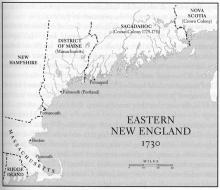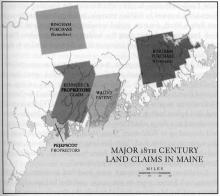The Waldo Patent
By 1660 the French and the English in Massachusetts both controlled parts of Maine. The French in eastern Maine claimed the land south and west to the Kennebec River, and the English claimed land north and east up to the Penobscot. Thus, the midcoastMidcoast
In Maine, generally refers to the area between the Kennebec and Penobscot Rivers. was claimed by both.
In 1729 the English king attempted to establish a crown colony called SagadahocSagadahoc
Native American place name meaning " mouth of the big river," given to the mouth of the Kennebec River. in midcoast Maine.
He authorized Colonel David Dunbar, the Surveyor-General of His Majesty’s Woods in AmericaSurveyor of Pines and Timber
Surveyor-General of His Majesty's Woods in America
"Surveyors of Pines and Timber" were British officials who surveyed New England's forest lands within ten miles of navigable waterways, selecting trees suitable for masts for ships of the British Navy, and marking these trees with the "King's Broad Arrow."
Read more., to settle the area.
Dunbar’s colony was not recognized by the wealthy merchants of the Massachusetts Bay Colony, who wanted Maine’s resources. These leaders were known as the Great ProprietorsProprietors
Those to whom the British king granted exclusive control over a colony. This allowed the king to indirectly control the colony without investing. Sir Ferdinando Gorges became one of the proprietors of the Province of Maine in 1622, splitting it at the Piscataqua River in 1629., and they revived Gorges'Gorges, Sir FerdinandoSir Ferdinando Gorges
c.1566-1647. Wealthy British nobleman and governor of Plymouth, a main sponsor of a number of exploring expeditions and colonization attempts in New England, having been granted major lands.
Read more. old land grants.
Bostonian Proprietor Samuel WaldoWaldo, Samuel Samuel Waldo
1696-1759. Merchant, land speculator and soldier, born in Boston, one of the propietors of Maine.Waldo was one of the generals at the capture of Louisbourg. He sucessfully recruited German immigrants to area between 1740 and 1753. was instrumental in getting rid of Dunbar and returning midcoast Maine to Massachusetts’ control. In return, he received a huge tract of land known as the Waldo PatentWaldo Patent
Land grant or patent also known as the Muscongus Patent. In 1630, John Beauchamp and Thomas Leverett obtained a grant of 36 square miles of land extending from the Muscongus River (Medomack) to the Penobscot Bay north to Hampden. It conveyed exclusive trading rights; about 1720 it passed into the hands of the Waldo family of Boston..


